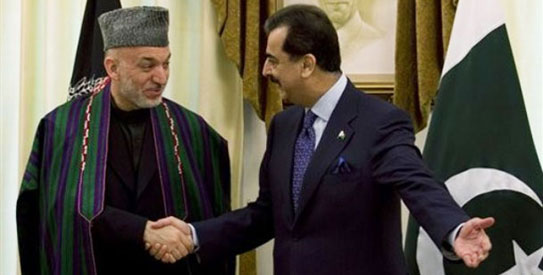 Hamid Karzai and Yusuf Reza GilaniMatthew Rosenberg writes in The Wall Street Journal of a complex political game being played amongst Afghan, Pakistani, and US officials:
Hamid Karzai and Yusuf Reza GilaniMatthew Rosenberg writes in The Wall Street Journal of a complex political game being played amongst Afghan, Pakistani, and US officials:
Pakistan is lobbying Afghanistan's president against building a long-term strategic partnership with the U.S., urging him instead to look to Pakistan --- and its Chinese ally --- for help in striking a peace deal with the Taliban and rebuilding the economy, Afghan officials say.
The pitch was made at an April 16 meeting in Kabul by Pakistani Prime Minister Yousuf Raza Gilani, who bluntly told Afghan President Hamid Karzai that the Americans had failed them both, according to Afghans familiar with the meeting. Mr. Karzai should forget about allowing a long-term U.S. military presence in his country, Mr. Gilani said, according to the Afghans. Pakistan's bid to cut the U.S. out of Afghanistan's future is the clearest sign to date that, as the nearly 10-year war's endgame begins, tensions between Washington and Islamabad threaten to scuttle America's prospects of ending the conflict on its own terms.
With the bulk of U.S.-led coalition troops slated to withdraw from Afghanistan by the end of 2014, the country's neighbors, including Pakistan, Iran, India and Russia, are beginning to jockey for influence, positioning themselves for Afghanistan's post-American era.
Pakistan enjoys particular leverage in Afghanistan because of its historic role in fostering the Taliban movement and its continuing support for the Afghan Taliban insurgency. Washington's relations with Pakistan, ostensibly an ally, have reached their lowest point in years following a series of missteps on both sides.
Pakistani officials say they no longer have an incentive to follow the American lead in their own backyard. "Pakistan is sole guarantor of its own interest," said a senior Pakistani official. "We're not looking for anyone else to protect us, especially the U.S. If they're leaving, they're leaving and they should go."
Mr. Karzai is wavering on Pakistan's overtures, according to Afghans familiar with his thinking, with pro- and anti-American factions at the presidential palace trying to sway him to their sides.
The leaks about what went on at the April 16 meeting officials appear to be part of that effort. Afghans in the pro-U.S. camp who shared details of the meeting with The Wall Street Journal said they did so to prompt the U.S. to move faster toward securing the strategic partnership agreement, which is intended to spell out the relationship between the two countries after 2014. "The longer they wait…the more time Pakistan has to secure its interests," said one of the pro-U.S. Afghan officials.
A spokesman for Mr. Karzai, Waheed Omar, said: "Pakistan would not make such demands. But even if they did, the Afghan government would never accept it."
Some U.S. officials said they had heard details of the Kabul meeting, and presumed they were informed about Mr. Gilani's entreaties in part, as one official put it, to "raise Afghanistan's asking price" in the partnership talks. That asking price could include high levels of U.S. aid after 2014. The U.S. officials sought to play down the significance of the Pakistani proposal. Such overtures were to be expected at the start of any negotiations, they said; the idea of China taking a leading role in Afghanistan was fanciful at best, they noted.
Yet in a reflection of U.S. concerns about Pakistan's overtures, the commander of the U.S.-led coalition, Gen. David Petraeus, has met Mr. Karzai three times since April 16, in part to reassure the Afghan leader that he has America's support, and to nudge forward progress on the partnership deal, said Afghan and U.S. officials.